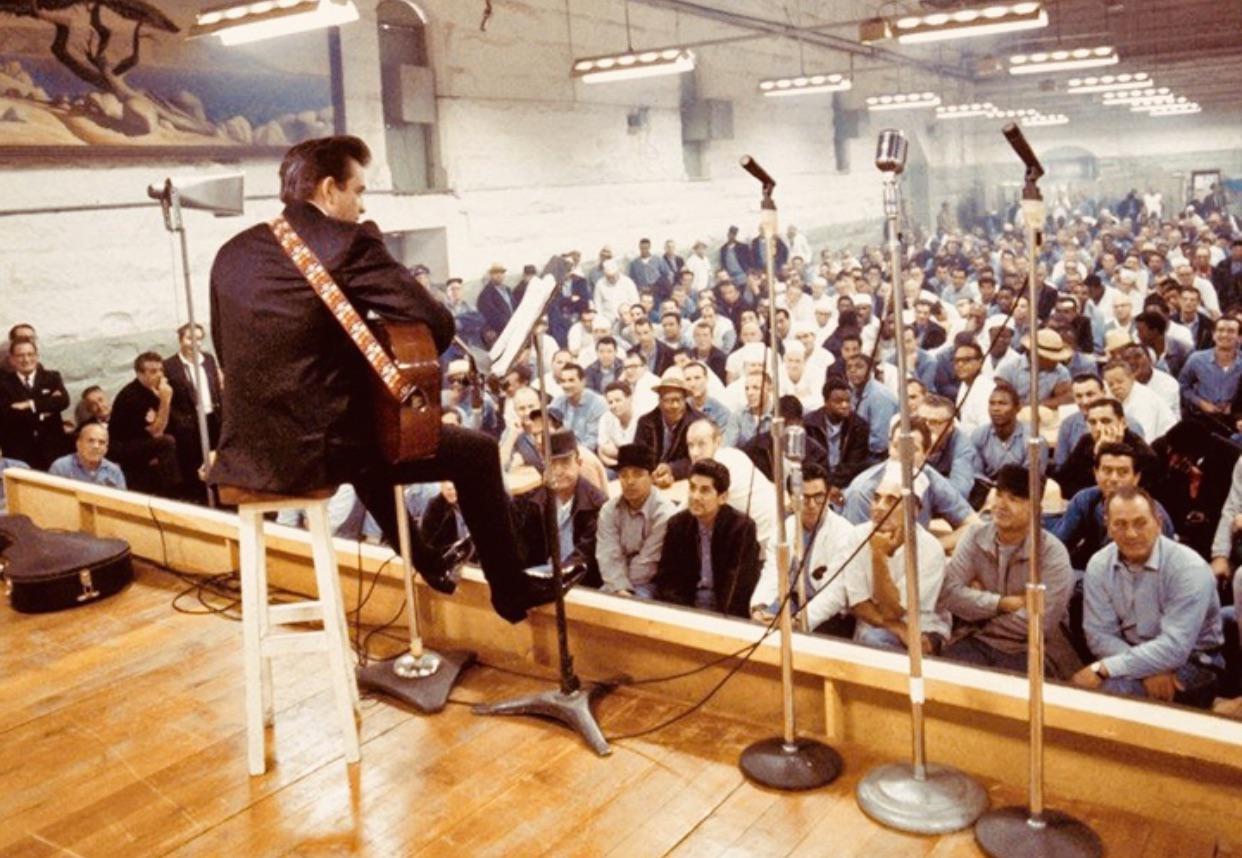By Chlotrudis Independent Film Society
Rating: 3 cats
Director: Bestor Cram

Country: united_states
Year: 2009
Running time: 90
IMDB: http://www.imdb.com/title/tt1334247/
Jason says: “Johnny Cash never did time, but his name will forever be associated with California’s Folsom State Prison; a great song and a great album will do that. The Folsom Prison concert is a definitive moment in Cash’s career, but as with all events, that moment has a lead-up and a postscript, as well as import to people beyond Johnny Cash. To call JOHNNY CASH AT FOLSOM PRISON the untold story of the concert would be overstating the case, but it is an interesting telling of what went on around it.
“There’s not necessarily a great deal said about Johnny Cash that fans don’t already know and others wouldn’t have learned from recent biographical film WALK THE LINE, but it is interesting to see it presented (compared to that movie) in less obvious service to a romantic or redemptive storyline. A fair amount comes from Cash himself, in a voiceover taken from a 1990s radio interview. He talks about his time in Germany transcribing Russian Morse code with a bit of pride, and describes his first prison show as being in the middle of a downpour at a prison rodeo. We also get some nifty insights into the writing of ‘Folsom Prison Blues’ from the surviving musicians, including how the melody was ‘adapted’ from ‘Crescent City Blues’ by Gordon Jenkins.
“Cash and his band weren’t the only people in the room, of course, and we get a number of stories from the audience. There’s a guard by the name of Jim Brown, as well as a pair of inmates. Millard Dedmond doesn’t seem to have any particular connection to Johnny Cash aside from having been in the audience, but Glen Sherley attracts Cash’s attention. Cash sees a kindred spirit in Serley – the filmmakers take pains to show that their initial creative processes are very similar – and playing a song written by the inmate during the concert, later going to bat for him with the penal system and giving him a place on the tour when he’s released. We also hear from Merle Haggard, a country and western star who, as he points out, had lived what Cash sang about.
“The way Dedmond’s and Serley’s respective stories end can, to a certain extent, be anticipated by how they’re represented in interview footage. Dedmond is a genial presence speaking for himself, while Sherley is spoken for by his sad-eyed children. Taking that as a given, the interviews are remarkably candid, enough to make it clear that Dedmond didn’t just have a long sentence because he was a black man stealing from a white woman, and that Johnny’s attention was probably an extremely mixed blessing for Serley. Haggard gets a few good lines in.
“There’s also a good deal of archive footage of Cash on various talk/variety shows, often including Serley. They’re interesting artifacts, especially as examples of how even celebrity-driven talk shows could talk about causes like prison reform and conditions without making them a punchline, although not exactly buried treasures. There’s no footage of the concert itself, but we do see plenty of photographer Jim Marshall’s images (he’s also an entertainingly pugnacious interview subject). A few songs from there concert – mostly ones that reference prison life – are presented in their entirety, accompanied by animation, and that winds up not being the greatest idea: Those sequences stop the movie in its tracks, and the style is often strange. A couple look like ads, spinning and stamping the words on-screen, and ’25 Minutes to Go’ has a cartoon Johnny dashing to and fro, which, even for a song that Cash is presenting as darkly comic, seems a bit off.
“As much as the filmmakers are apparently still hoping for a theatrical run after the festival circuit, the film has already found its natural home as a bonus disc included with a deluxe reissue of the original album. That may be a little disappointing, but at least it will get the film to the audiences who have the most interest in the material. 3 cats
“Seen 24 April 2009 at the Somerville Theater #5 (Independent Film Festival of Boston)”
